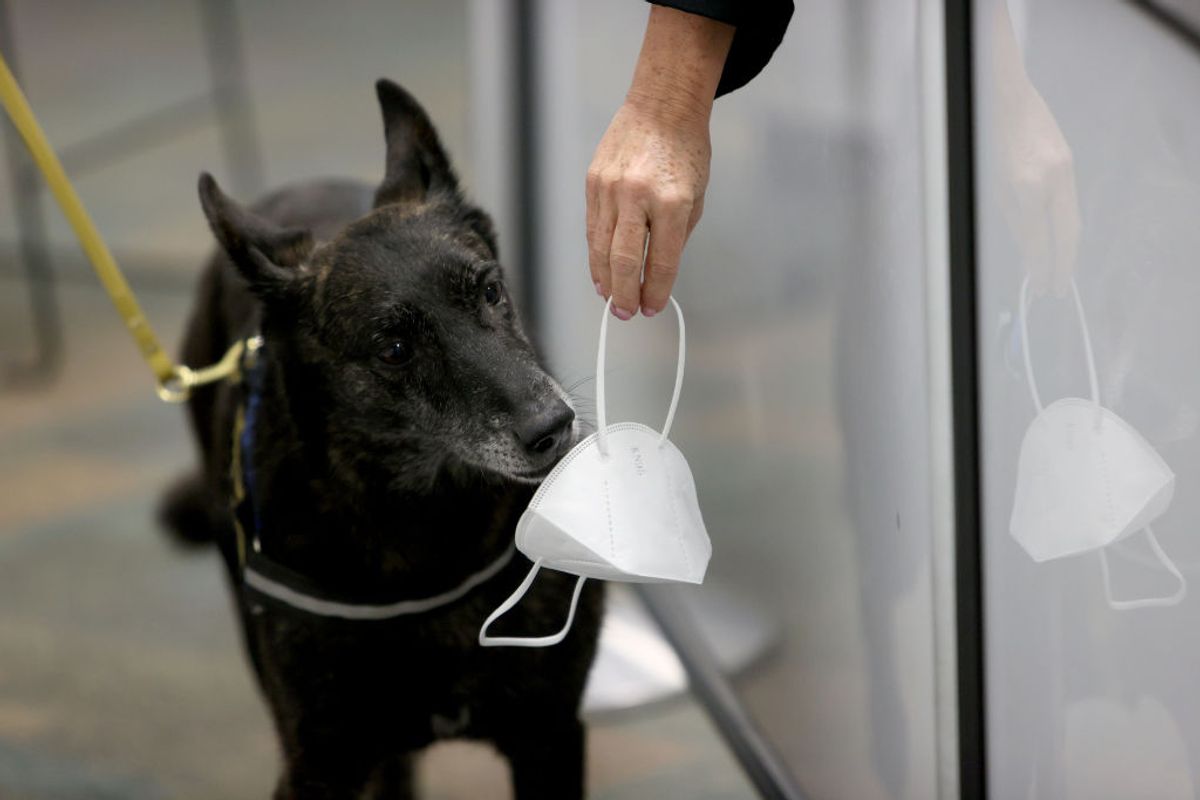Miami has officially become the first city in the U.S. to use COVID-19–sniffing dogs at an airport to help stop the spread of the coronavirus.
Two dogs — a Belgian Malinois named Cobra and a Dutch shepherd named One Betta — are currently being stationed at an employee security checkpoint. The detector dogs aren't checking for COVID-19 on passengers, but rather employees as part of a pilot program that's been extended through October. Their noses are a crucial weapon in a fight against COVID: currently, the state of Florida is at the tail-end of yet another deadly COVID-19 surge
According to the Miami Herald, the two dogs, who work Monday, Wednesday and Friday from 11 a.m. to 3 p.m., together detected at least two cases since last week.
Want more health and science stories in your inbox? Subscribe to Salon's weekly newsletter The Vulgar Scientist.
"This pandemic has pushed us to innovate to stop the spread," said Daniella Levine Cava, Mayor of Miami-Dade County, in a statement. "We're proud to do everything we can to protect our residents. I look forward to seeing how the airport tests their skills and expanding the pilot program to other County facilities."
Reportedly, the two dogs are able to detect COVID-19 in a person with an estimated 99 percent accuracy. While on paper that sounds incredible, the logistics of such an act are a bit confusing. Viruses, like coronavirus, are incredibly small, and do not alone produce a scent.
So how do dogs "smell" something so small and odorless?
It turns out that when a person is infected with the COVID-19, or any disease, it causes metabolic changes that result in the production of something called volatile organic compounds (VOCs). VOCs are often associated with man-made chemicals, and are off-gassed from certain drying paints and lacquers. But volatile organic compounds also scent perfumes, and they are emitted by animals and plants as well.
Certain VOCs are expelled from a person's breath and sweat when they have COVID-19, and dogs can be trained to detect such scents.
"Scent-detection dogs can accurately detect low concentrations of volatile organic compounds, otherwise knowns [sic] as VOCs, associated with various diseases such as ovarian cancer, bacterial infections and nasal tumors," said Cynthia Otto, director of the center and professor of working dog sciences and sports medicine. "These VOCs are present in human blood, saliva, urine or breath."
In a typical training, various samples of these bodily fluids are used. If the dog correctly indicates a sample that was positive for the disease, the dog receives a treat. It's similar to how dogs have previously been trained to detect other illnesses in people, like cancer.
"Being able to apply decades of research in this way, to provide an additional layer of protection to airport employees at Miami International Airport — it's humbling," said Dr. Kenneth G. Furton, FIU Provost and Professor of Chemistry and Biochemistry. "These dogs are another valuable tool we can leverage to help us live with this ongoing pandemic."
To date, there have been a couple of studies indicating that dogs can successfully sniff out COVID-19 in people, but the accuracy often varies and not all have been peer-reviewed. According to one pilot study that was published in the peer-reviewed journal BMC Infectious Diseases, eight dogs were trained for 1 week to detect saliva or tracheobronchial secretions of SARS-CoV-2 infected patients. The study was randomized, double-blinded and controlled. The dogs were able to differentiate between samples of those infected with COVID-19, and samples of those who weren't infected. The dogs had a detection rate of 94% out of 1,012 randomized samples. The study's authors noted that the data was very promising.
For centuries, humans have tapped the power of the canine nose. Unlike human noses, which have 5 to 6 million scent receptors, dogs' noses have 300 million scent receptors. This allows dogs to detect very tiny concentrations of odor that humans can't. Working dogs have already proven to be successful in sniffing out firearms, drugs, and explosives.
But just how useful are dogs for combatting COVID-19?
"No one is saying they can replace a PCR [Polymerase Chain Reaction] machine, but they could be very promising," veterinary neurologist Holger Volk at the University of Veterinary Medicine at Hanover in Germany told Nature. Polymerase Chain Reaction (PCR) machines are used in laboratory settings to probe DNA.
Miami isn't the only city in the world leaning on COVID-19 detection dogs.
In August 2020, police in Dubai deployed 38 sniffer dogs to sniff out COVID-19 from human sweat samples. Dogs were also used at Helsinki Airport at an arrivals hall, where passengers were asked to wipe their skin and place the wipe in a cup, which the dogs then sniffed. If the result was positive, a passenger would be directed to the Helsinki University Hospital's health information station. Officials in Helsinki found the process to be not only effective, but also budget-friendly.
"PCR test cost approximately 4 million euros per month and sniffing less than 100,000 euros" said Anna Hielm-Bjorkman of Helsinki University,a docent in clinical research of companion animals.



Shares